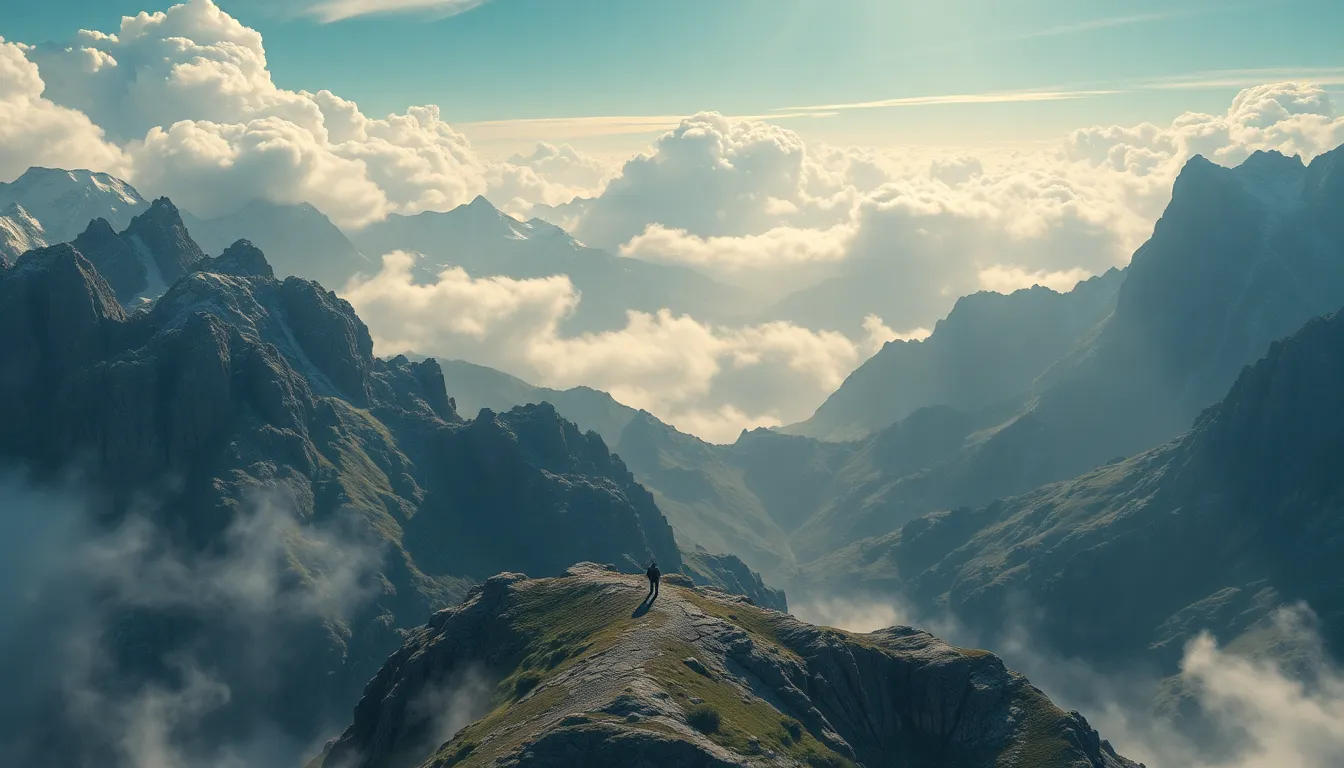The Peaks of Paradise: Myths of Utopian Realms in High Places
Introduction: The Allure of Utopian Myths
Utopia, a term that conjures visions of paradise, represents an idealized place where human existence is perfected. Rooted in the Greek words ‘ou’ (not) and ‘topos’ (place), it signifies a space that is fundamentally unattainable yet perpetually pursued. This quest for an ideal existence has been a significant theme throughout human culture, inspiring countless stories, philosophies, and communal experiments. In this article, we will explore the captivating myths surrounding high-altitude realms—where the earth meets the sky and dreams ascend to new heights.
Historical Context: Utopian Ideals Through the Ages
Throughout history, various civilizations have envisioned utopias that often reflect their geographical and cultural contexts. From the ancient Greeks to the Eastern philosophies, the concept of an exalted realm has evolved, shaped by the landscapes that bordered their lives.
- Ancient Civilizations: Many ancient societies believed that the gods resided on high mountains, which were seen as bridges between the heavens and the earth. For instance, the Greeks revered Mount Olympus as the dwelling place of their deities.
- Geographical Influence: Elevation played a crucial role in these visions. Mountains offered not only a physical elevation but also a metaphorical ascent towards perfection.
Sacred Mountains: Spirituality and the Quest for Perfection
Mountains have always held a special place in the spiritual beliefs of various cultures. They serve as powerful symbols of aspiration and transcendence.
- Mount Olympus: In Greek mythology, this peak was not only the home of the gods but also a symbol of human aspiration toward divine qualities.
- Mount Meru: In Hindu and Buddhist cosmology, it is considered the center of all physical, metaphysical, and spiritual universes, embodying the idea of a perfect world.
The intersection of spirituality, mythology, and physical elevation creates a profound connection that continues to inspire seekers of perfection.
Literary Representations of High-Altitude Utopias
Literature has long been a medium through which utopian ideals are explored, often using high places as a narrative device. Works such as Thomas More’s “Utopia” not only describe perfect societies but also embody the aspirations of their time.
- Utopia by Thomas More: This seminal work presents a fictional island that reflects the author’s ideals of a perfect society, illustrating how geography can influence societal structures.
- Other Literary Examples: Various authors have utilized mountains as metaphors for isolation, enlightenment, or the unattainable, reflecting the human condition’s complexities.
Cultural Myths: Folklore and Legends of Elevated Lands
Across cultures, myths about high places abound, often representing the human yearning for an ideal life. Legends such as Shangri-La and El Dorado illustrate how elevated lands symbolize abundance and tranquility.
- Shangri-La: Popularized by James Hilton’s novel “Lost Horizon,” this mythical Tibetan valley represents peace and eternal happiness, embodying the ultimate escape from the chaos of modern life.
- El Dorado: The legend of a city of gold in the Andes reflects humanity’s quests for wealth and prosperity, often leading to exploration and conquest.
These myths serve as powerful symbols, guiding humanity’s pursuit of ideal living conditions.
Modern Interpretations: Utopian Visions in Contemporary Society
In contemporary society, the vision of utopian spaces in high places has taken on new forms. From eco-villages to mountain retreats, our aspirations reflect current values and technological advancements.
- Eco-Villages: These communities prioritize sustainability and harmony with nature, often situated in elevated locations to embody a retreat from urban chaos.
- Mountain Retreats: Many seek solace in the mountains, where modern amenities blend with natural beauty, fostering a sense of peace and connection to nature.
Technology and sustainability play pivotal roles in shaping these modern interpretations, reflecting our evolving relationship with both nature and community.
Challenges of Realizing Utopian Dreams in High Places
Despite the allure of high-altitude utopias, numerous challenges hinder these dreams. Environmental and social obstacles often complicate the realization of ideal living conditions.
- Environmental Challenges: Mountainous regions face issues such as climate change, deforestation, and loss of biodiversity, threatening the delicate ecosystems.
- Social Challenges: The balance between preserving local cultures and integrating modern ideals often leads to tensions within communities.
These challenges highlight the tension between idealism and practicality, underscoring the complexity of creating true utopias.
Psychological Aspects: The Human Desire for Elevated Utopias
The allure of high places is deeply rooted in human psychology. The desire for elevation is often linked to the search for solace, inspiration, and escape from the mundane.
- Escapism: Many individuals seek high places as a refuge from everyday struggles, embodying the psychological need for an idealized existence.
- Idealism: The pursuit of utopian dreams reflects an innate human tendency to aspire for betterment, both personally and collectively.
Case Studies: Real-World High-Altitude Utopias
Several communities and projects exemplify the pursuit of utopian ideals in mountainous regions, offering insights into both successes and failures.
- Bhutan: Known for its Gross National Happiness index, Bhutan represents a unique model of governance that prioritizes well-being over economic growth.
- Eco-Communities in the Andes: Various initiatives aim to create sustainable living practices, although they often face challenges from external pressures and local dynamics.
Conclusion: The Ever-Evolving Myth of Paradise in the Heights
The myths of paradise in high places are enduring and ever-evolving, reflecting our deepest aspirations for an ideal life. As society continues to grapple with environmental and social challenges, these utopian dreams remain relevant, inspiring future generations to seek elevated ideals and spaces. The journey toward these lofty aspirations is as significant as the destination itself, reminding us that the pursuit of paradise is an intrinsic part of the human experience.




